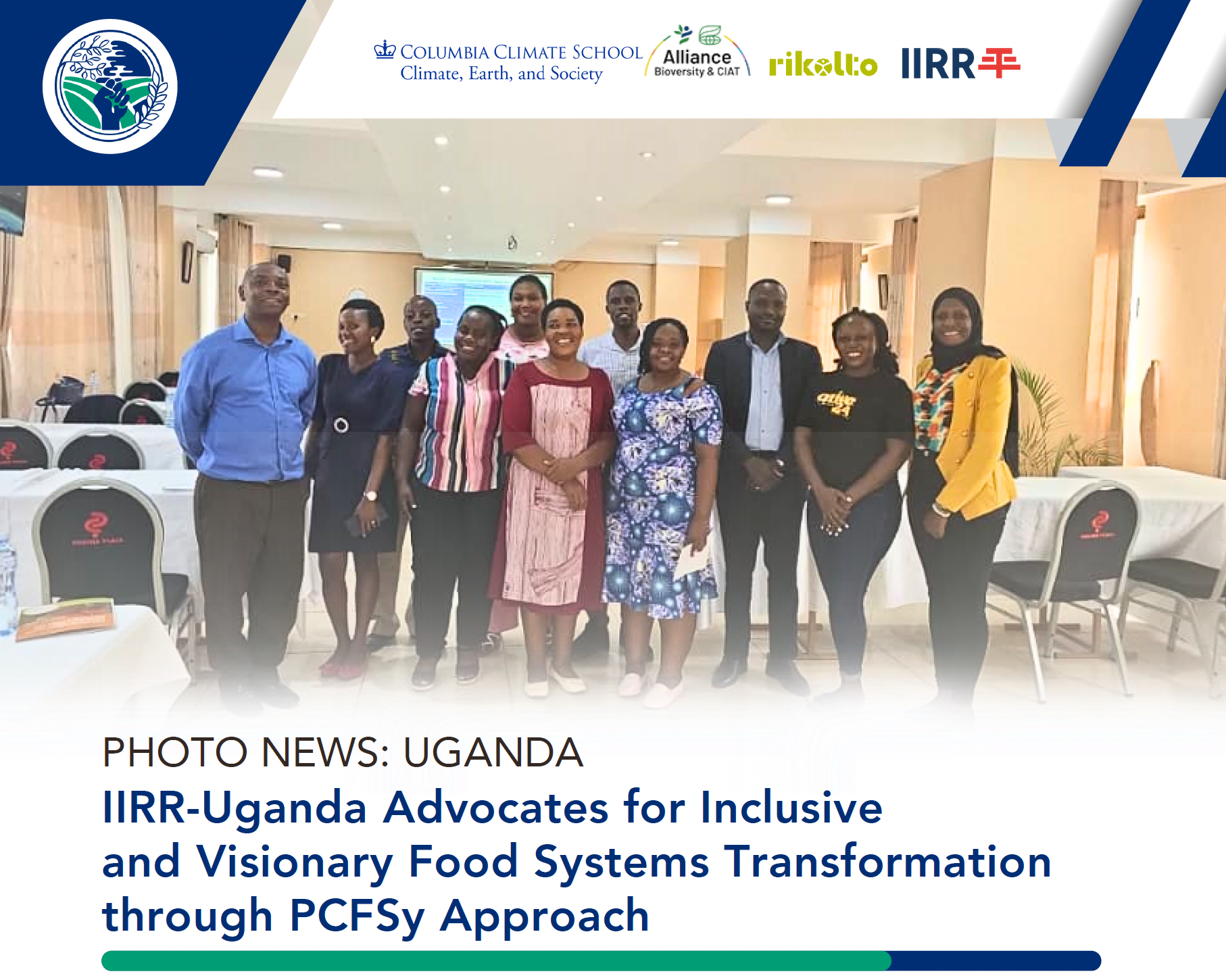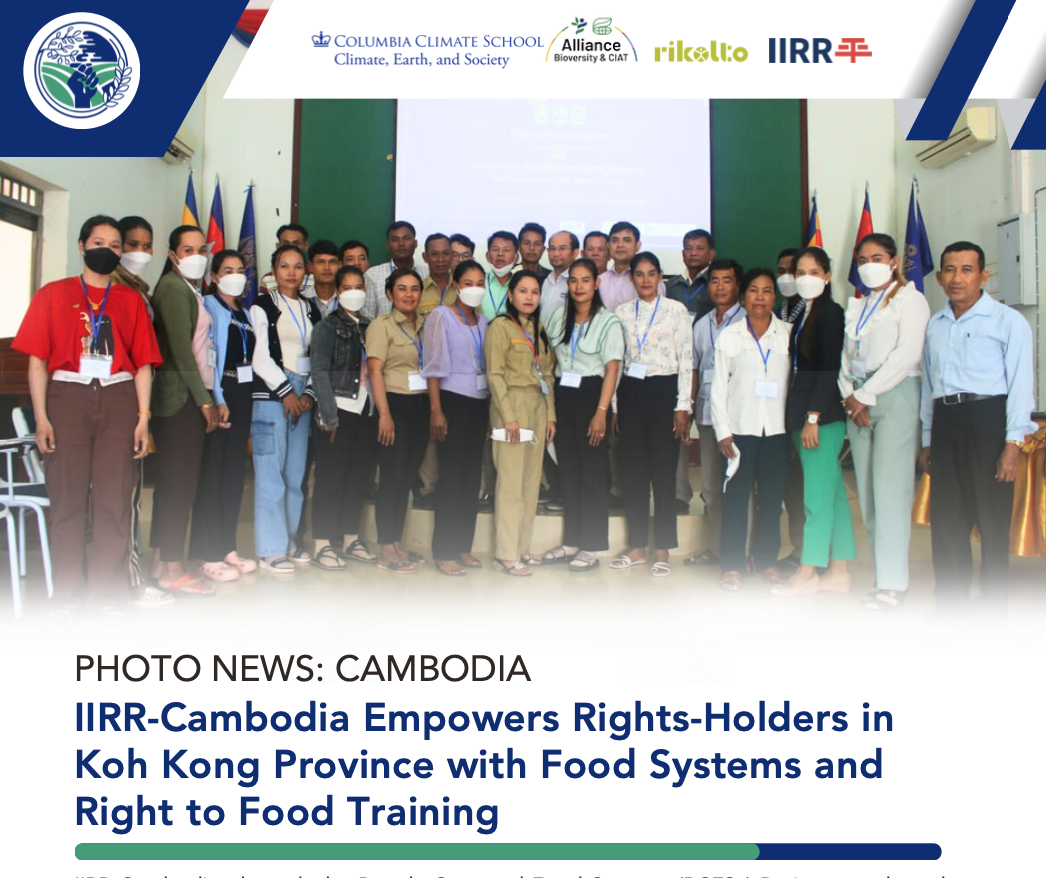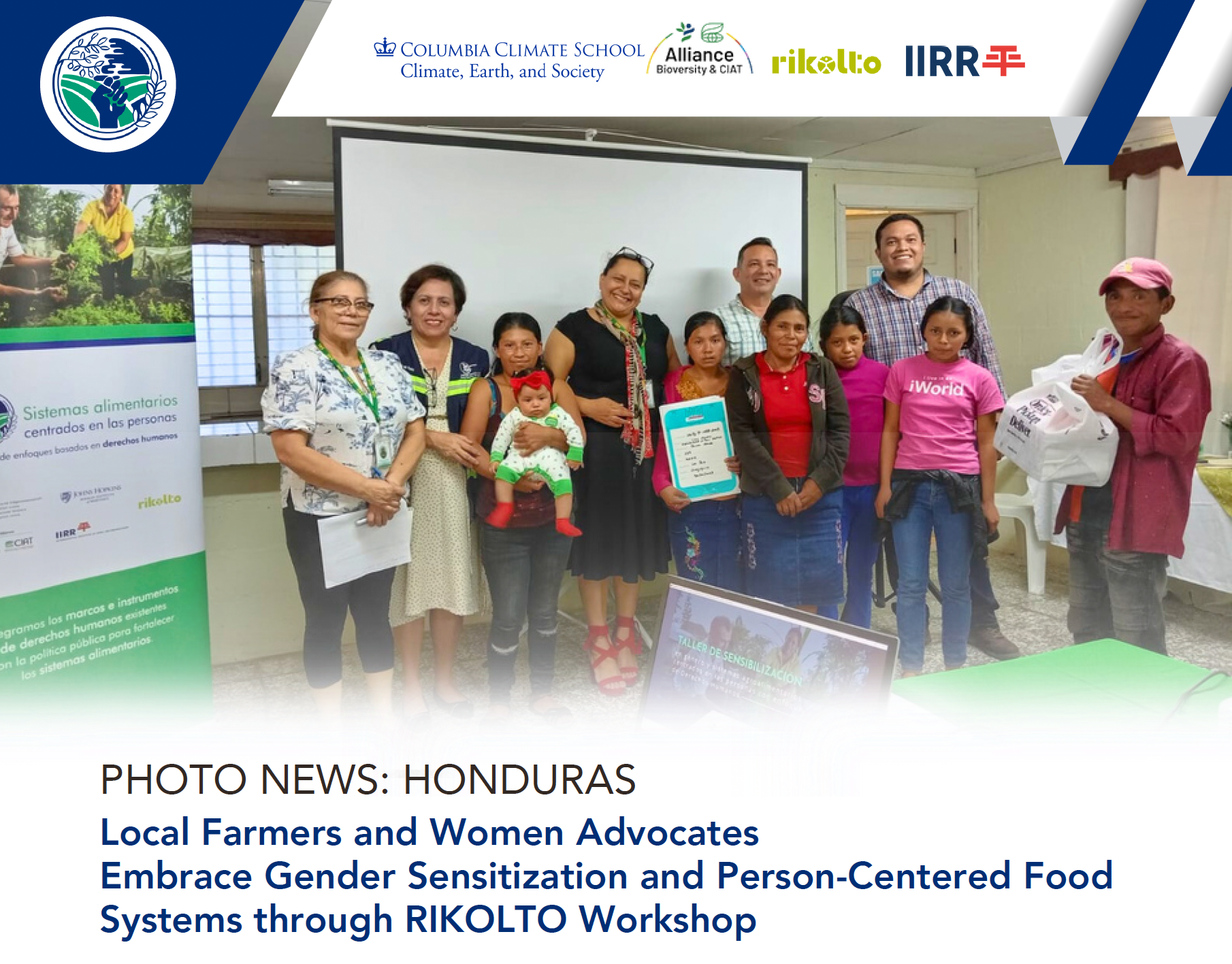April 2024 Country Updates: Cambodia, Honduras and Uganda
November 2023 Photo News Updates: Cambodia, Ethiopia, Honduras & Uganda
October 2023 Photo News Updates: Cambodia, Ethiopia, Honduras & Uganda
Conversatorio “Los Retos del Derecho a una Alimentación Adecuada en Honduras”
Join us! 13 DE JULIO 2023
More info here.
The right to adequate food: From theory to practice in Honduras
By: Raul Pinel, Rikolto
June 19, 2023
Spanish version is here.
The right to food is a right recognized both in the UN Universal Declaration of Human Rights (1848) and in the International Covenant on Economic, Social and Cultural Rights of 1966. This is an inclusive right, where everyone has the right to have access to available, affordable and adequate food (biologically and culturally) individually or collectively and permanently (OHCHR).
According to FAO, food is a basic need, and everyone has the right to access an adequate, safe diet with appropriate nutritional requirements. Human rights-based policies related to food systems seek to ensure that food is accessible, available, adequate and affordable to all people without discrimination of race, age, religious belief, among others, based on Article 25 of the Universal Declaration of Human Rights (UDHR).
However, the current world food system and the lack of applicability of policies related to human rights, is characterized by inequality in individuals or communities in rural areas; millions of people suffer from hunger, malnutrition and food insecurity, despite the fact that most food is produced in rural areas. In Honduras, where 53.1% of the 9.7 million inhabitants are women, 34% of households spend between 50% and 65% of their income on food, while 12% of households spend 75% of their income on food (INE, 2022).
This access to food is also determined by the levels of poverty in Honduras, where almost 56% of people in urban areas live in poverty; and 63% of people in rural areas live in extreme poverty. Monetary poverty is defined by the cost of the basic food basket, which in Honduras in April 2023 was 11,968.90 lempiras for a family of five (2,393.78 lempiras per person, equivalent to $96.96 or 30% of income in rural areas). The minimum monthly salary for a worker in the rural areas is 7,802.10 lempiras ($315.88).
Likewise, the National Institute of Statistics (INE) indicates that in the last 20 years (2001-2021) the Gini coefficient (which measures wage inequality) has oscillated between 0.51 and 0.60, with its highest peak in 2005 and its lowest peak in 2015. In 2021, the Gini coefficient was 0.55. Also, the Human Development Index (HDI 2020) in Honduras is the lowest in Central America, at 0.634 (rank 132/189), which makes us note that the country is below Nicaragua and Guatemala in basic aspects such as life expectancy, adult literacy and a decent standard of living (GDP per capita).
Since 2006, Honduras began to make efforts to implement regulations regarding Food and Nutritional Security. In that year, the Food and Nutritional Security Policy (PSAN) was designed, and five years later in 2011, by legislative decree (25-2011), the Food and Nutritional Security Law (SAN Law) was approved, creating a series of mechanisms for its implementation. These mechanisms included the National Food and Nutrition Security System (SINASAN), which included a National Council (CONASAN), the Interinstitutional Technical Committee (COTISAN), the Surveillance Commission (COVISAN) and the Technical Unit (UTSAN), the latter being the only unit that remains in force to date due to the changes in governmental structures in 2022.
It is necessary to better integrate the human rights framework and approach with the policies and actions of the food system through the implementation of relevant articles of the United Nations Declaration on the Rights of Peasants and People Living in Rural Areas (UNDROP) and other existing regulations, develop capacities and accountability tools that allow moving from a theoretical framework to a real practice of human rights to food for vulnerable groups and groups that guarantee these rights.
Thus, in the year 2021, the People Centered Food Systems Project: with a human rights-based approach (HRBA) began to be conceptualized. It is currently being implemented in four countries: Honduras, Cambodia, Uganda and Ethiopia, with funds from the Swiss Agency for Development and Cooperation (SDC) through a consortium led by John Hopkins University, Rikolto, IIRR and Alliance Bioversity-CIAT.
The project aims to better protect the rights of producers and improve their food security and well-being through the effective implementation of UNDROP and the Voluntary Guidelines, which will result in increased awareness, access to information and capacity building of the participating groups (policy makers, duty bearers, duty bearers and process facilitators); as well as the participation of right holders in activities to influence food sector policies related to the UNDROP and Voluntary Guidelines and their relationship with food systems and the right to adequate food, as well as accountability processes. In the end, it is hoped that vulnerable groups will be able to demand their rights and decision-makers will be able to safely enforce policies such as UNDROP and other regulations that reinforce the rights of peasants in rural areas, who lack protection under the law despite the different instruments that countries have signed.
Rikolto, through its Food Systems for Cities Program (GF4C) seeks healthy food environments and inclusive supply chains that favor access to healthy, nutritious and sustainably produced food for all, especially vulnerable groups promoted by local governments. In this way, the organization's objectives are aligned with those of the project (adequate food, sustainable production and governance, among others).
In mid 2022, the information gathering (baseline) of the project begins, using the methodology developed by CIAT that includes a two-day workshop with the purpose of collecting critical information from right holders, stakeholders (Non-Governmental Organizations (NGOs) and Civil Society Organizations (CSOs); and policy makers (government sector).
In Honduras, these workshops were conducted between July and September 2022 with the participation of stakeholders from 44 organizations/institutions from the three groups mentioned above (13 policy makers, 21 groups representing right holders and 10 NGOs/CSOs), yielding important information on the awareness, importance and use of UNDROP and the HRBA.
The data indicate that there is a need for the three groups to know more about the HRBA and the different treaties and mechanisms within the existing regulations; in addition, the perception of the importance of these issues by the three groups is evident; whereas, the use of the regulations by right holders is very low, and in the other two groups there are those who know and implement the regulations and others who do not. These results guided us in defining the following steps: determine the type of training to reinforce capacities in each of the groups participating in the intervention.
In this period of implementation, the project has made progress in several areas, such as the update on the food situation (through the baseline with the information collected with the participating groups), the review of mechanisms to ensure the right to food and the implementation of food policy (development of initial drafts of food policies at sub-national and local government level) and; the creation of a food security office in the Municipality of Las Vegas, Santa Barbara). The Rural Reconstruction Program (PRR), RIKOLTO's partner, is moving towards becoming a provider of the National School Feeding Program (PNAE) and alliances have been established especially with the Technical Unit for Food and Nutritional Security (UTSAN), as well as with the Office of the Human Rights Commissioner (CONADEH).
As part of the following steps, based on the analysis of the baseline data, efforts were joined for the discussion on protecting the rights of vulnerable groups on the use of traditional phyto-genetic resources as cited by UNDROP in Article 19, since in February 2022, the Supreme Court of Honduras declared unconstitutional the Law for the Protection of Plant Varieties (Decree No. 21-2012), which prohibited farmers from saving, exchanging and giving away seeds under the threat of heavy penalties.
For the consortium, it is crucial to complement these developed capacities with advocacy actions, such as policy dialogues, monitoring and accountability mechanisms in relation to human rights; and an analysis of policy coherence between national and international policies at different scales.
What is coming in the project refers to collective work in order to analyze and propose ways to update and implement food policies. Thus, we will organize with allies, representative organizations in the country, spaces for discussion, reflection and proposals; we are interested in contributing with more updated data to food policies; strengthening the institutional framework; linking competent entities with civil society organizations to move forward in a participatory manner; and reinforcing the work of the technical roundtables and multi-actor spaces in relation to food systems. We all need to act to achieve structural changes, so that no one is left behind.
Food systems are directly linked to human rights and several articles of the UDHR. Unfortunately, food systems often do not guarantee these rights of their citizens because they are affected by other factors such as poverty, inequality, lack of access to land and inputs, lack of access to credit, and lack of respect for the rights of agricultural workers, among others.
The important thing is to start and analyze how we contribute through this project and other actions, to improve and transform food systems to ensure the human right to food. Not only from the productive point of view, but taking into account deeper causes that produce food insecurity, the lack of implementation of existing policies or the implementation of adequate policies, but above all the direct involvement of the communities. Our goal should be to fight for fair food systems that promote the human rights of individuals while respecting existing regulations, implementing them to achieve a common good as a society as a whole.
References
El Derecho a una alimentación adecuada. Boletin Informtivo No. 34.June 2012. Geneva Switzerland. ONU/FAO.
La Declaración Universal de los Derechos Humanos, Diciembre 1978. Naciones Unidas. Un.org.
United Nations Declaration on the Rights of Peasants and Other People Working in Rural Areas. United Nations. Octubre 2018.
Analisis del Impacto de la Pandemia por COVID 19 sobre el estado de Seguridad Alimentaria y Nutricional en Niños (as) menores de 5 años y mujeres en edad reproductiva ()15-49 años) en 39 municipios seleccionados en el país. Instituto Nacional de estadísticas de Honduras 2022.
Encuesta Permanente de Hogares de Propósitos Múltiples Instituto Nacional de estadísticas de Honduras 2022.
La gaceta. Diario Oficial de la República de Honduras. Decreto 21-2012. Tegucigalpa, Honduras.
Hogares en Situación de Pobreza. Instituto Nacional de estadísticas de Honduras 2022.
https://www.ohchr.org/sites/default/files/Documents/Publications/FactSheet34sp.pdf
















